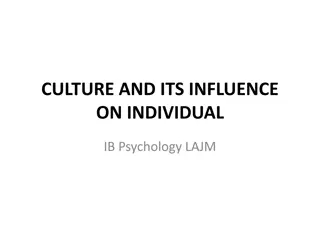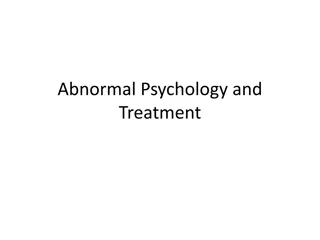Understanding Socio-Cultural Factors of Abnormal Behavior in Psychology
Exploring the impact of socio-cultural factors on abnormal behavior, this article delves into the influence of societal pressures, cultural norms, and economic status on mental health. The socio-cultural model emphasizes how societal criteria shape perceptions of abnormality, highlighting the role of social and cultural contexts in mental well-being and disorder development.
Download Presentation

Please find below an Image/Link to download the presentation.
The content on the website is provided AS IS for your information and personal use only. It may not be sold, licensed, or shared on other websites without obtaining consent from the author. Download presentation by click this link. If you encounter any issues during the download, it is possible that the publisher has removed the file from their server.
E N D
Presentation Transcript
B.A. PART I (H) 29 B.A. PART I (H) 29th th JULY 2020 Topic Topic- - Socio Socio- -Cultural Factors of Abnormal Cultural Factors of Abnormal Behaviour Behaviour JULY 2020 KUMARI RANJEETA GUEST FACULTY M. L. ARYA COLLEGE, DEPTT. OF PSYCHOLOGY E-mail- bkranjeeta@gmail.com Mb. No.- 8969020842
B.A. PART I (H) PAPER II UNIT I (ABNORMAL PSYCHOLOGY) SOCIO-CULTURAL FACTORS OF ABNORMAL BEHAVIOUR SOCIO-CULTURAL FACTORS OF ABNORMAL BEHAVIOUR According to the American Psychological Association (APA), socio-cultural factors are environmental conditions that have a role in both adaptive, normal behaviors as well as in maladaptive behaviors, mental retardation, or social pathology. Most aspects of mental illness and psychological well being are influenced by social factors (such as gender, social class, race and ethnicity, and household patterns) and social institutions (such as disability and social security systems, labor markets, and health care organizations).
B.A. PART I (H) PAPER II UNIT I (ABNORMAL PSYCHOLOGY) SOCIO-CULTURAL FACTORS OF ABNORMAL BEHAVIOUR There are many ways to approach abnormal psychology, including the socio-cultural approach, which looks at the influence of society and culture on a person's mental health. Key components of the socio-cultural approach include societal pressures, cultural rules and expectations about race, gender and sexual orientation. Low socioeconomic status has been linked to higher rates of mental and physical illness (Ng, Muntaner, Chung, & Eaton, 2014) due to persistent concern over unemployment or under-employment, low wages, lack of health insurance, no savings, and the inability to put food on the table, which can then lead to feeling hopeless, helpless, and dependent on others.
B.A. PART I (H) PAPER II UNIT I (ABNORMAL PSYCHOLOGY) SOCIO-CULTURAL FACTORS OF ABNORMAL BEHAVIOUR This situation places considerable stress on an individual and can lead to higher rates of anxiety disorders and depression. Borderline personality disorder has also been found to be higher in people in low-income brackets. Outside of biological and psychological factors on mental illness, race, ethnicity, gender, religious orientation, socioeconomic status, sexual orientation, etc. also play a role, and this is the basis of the socio- cultural model.
B.A. PART I (H) PAPER II UNIT I (ABNORMAL PSYCHOLOGY) SOCIO-CULTURAL FACTORS OF ABNORMAL BEHAVIOUR A socio-cultural model of abnormality emphasizes the social and cultural context, going so far as to suggest that abnormality is a direct function of society's criteria and definitions for appropriate behavior. In this model, abnormality is social, not medical or psychological. Social and cultural context can influence the kinds of stresses people experience, the kinds of disorders they are likely to develop, and the treatment they are likely to receive. Social factors represent another important set of influences on consumer behavior. Specifically, these are the effects of people and groups influencing one another through culture and subculture, social class, reference groups, and family.
B.A. PART I (H) PAPER II UNIT I (ABNORMAL PSYCHOLOGY) SOCIO-CULTURAL FACTORS OF ABNORMAL BEHAVIOUR Socio-economic factors include occupation, education, income, wealth and where someone lives. Poorsocial and economiccircumstancesaffect health throughout life. Social and psychological circumstancescan cause long-term stress. Continuing anxiety, insecurity, low self-esteem, social isolation and lack of control over work and home life, have powerful effects on health. Main factors : Income, Education, Occupation, Wealth, Health, Political participation, Language Development, Disparities in language acquisition.























